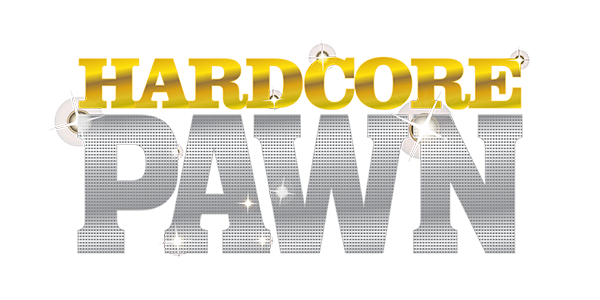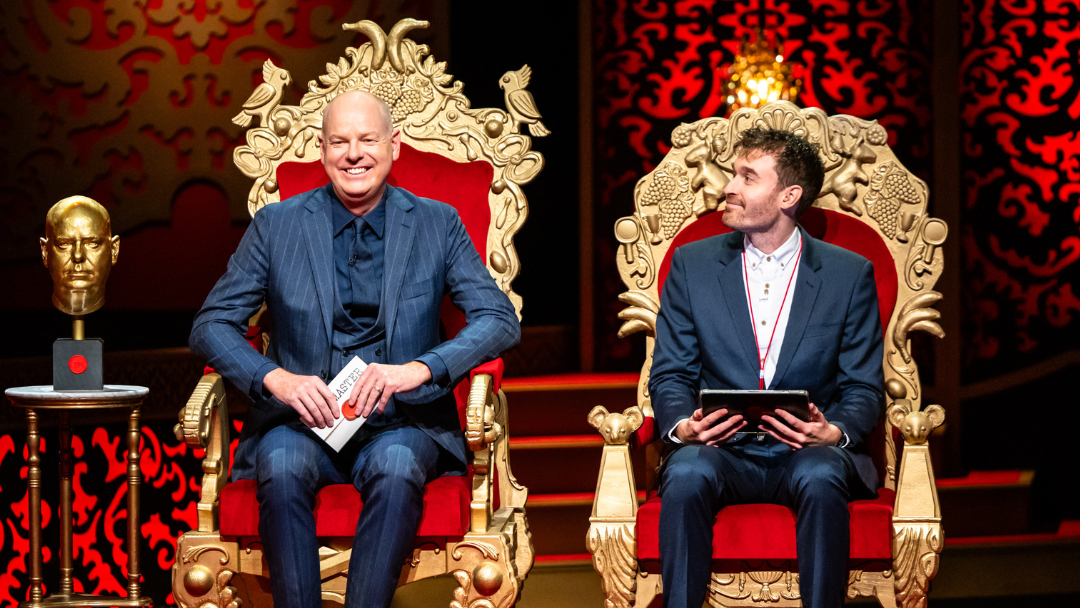Taskmaster Australia returns in 2024 after an absolute banger of a first season where five comedians competed for glory through a series of mind-boggling and hilarious tasks.
Taking on the challenge in Season 2 are the very funny Anne Edmonds, Jenny Tian, Josh Thomas, Lloyd Langford, and Wil Anderson, all under the watchful eye of the titular Taskmaster, Tom Gleeson.
Sitting by Gleeson's side is his trusty assistant, Tom Cashman, dutifully taking notes and reporting back on all the ups and downs of each task.
For several weeks, the comedians will face tasks that are then played in front of each other, a live audience, and the Taskmaster himself who scores them accordingly and crowns one the winner.
Based on the UK series, Taskmaster has become a worldwide phenomenon meaning that when the Aussie version launched in 2023 there was pressure to stand up to the success of other international spin-offs.
"My overall reaction was relief that I wasn't abused for ruining the format," Tom Cashman told 10 Play with a laugh. "It was - in my view at the time - legitimately a risk! There is pressure because it exists and because people like it, if it doesn't live up to expectations then you get in trouble.
"That was my main takeaway," the comedian added, "getting the sense that I'm not in trouble. Which is kind of how I live my life more generally... just trying to get by without being in trouble."
In his role as Taskmaster's assistant, Cashman finds himself in more and more trouble as frustrated comedians struggle to complete tasks like "Do the bravest thing with this ream of paper" or "Deliver this pizza to Tom".
Often the tasks seem deceptively simple, but with time constraints or unseen parameters making life more difficult for the comedians, hilarity always ensues. Cashman, meanwhile, has to remain as objective and stoic as possible.
"It comes a bit naturally to me," he admits," I was a basketball referee in high school for a few years and it really does feel like I'm doing that again.
"You'd ref some of the worst leagues, Div 5 Under 8 Girls and some of the stuff they're doing... they're falling over everywhere, running into each other and it's simply disrespectful to laugh at them because all their parents are there," Cashman joked.
But his objectivity also plays into a deep respect for the competition, by sticking to the script that "all the information you need is in the task" he's not accidentally giving one of the comedians some kind of advantage. "It would ruin the fairness, which I think makes the show so good, that it is real," he added.
"They are struggling through these things, they don't have the information that has been a secret up until now."
There are exceptions, of course, when the absurdity of the situation comes at a cost. In Season 1, Cashman stood and watched Danielle Walker struggle for several hours in an effort that reduced both to tears.
In the second season, Cashman became more involved in the development and writing of the tasks, admitting that part of what he enjoys "which is a bit sick" is the difference in information between what he has and what the comedians in front of him have.
"They're seeing [the task] for the first time and I know what's coming. The longer you've sat with it, the more you've had a bit of a think about the kind of things they might do, for example... but then, of course, the thing they actually try to do you could have never thought of in a million years.
"It’s basically designing a little scenario to challenge someone and allow them to be funny within so it’s obviously satisfying if you liked a particular one and you see it working," he said.
After the comedians attempt the tasks themselves, their efforts are shown in front of a live audience for them to relive their glory - or more commonly their struggles - with Gleeson heckling their attempts and ranking each for points.
Coming together for the studio records are the most fun in Cashman's opinion, not only because the comedians are now seeing how they did throughout the series but because it also brings them together in a very unique way.
'It's almost like shared trauma where they watch each other go through the same stuff they did, and you can see their relationship developing over the course of 10 weeks," he explained.
For the most part, the comedians are filming tasks alone - with the crew instructed to not interact with them while doing tasks, Cashman is really the only person they can bounce off and speak to.
"They go from this lonely experience to, 'Oh, four other people went through exactly the same thing, and mine wasn't even the shittest!'"
It's not a surprise that Cashman, whose stand-up often takes a very analytical approach to the world, has a preference for more "measured" tasks. Broadly speaking you can break tasks into two categories, ones that can be measured and ones that are more obtuse and rely on the Taskmaster's judgement.
"I think because I'm a competitive person and maybe because I kind of enjoy objectivity, my favourite would be the first kind. It's a bit like being the referee of a sport because they're trying to achieve a specific thing," he explained.
"I suppose also failure or success is more clear, whereas the subjective ones you find out in the studio whether the Taskmaster likes it or not... The ultimate question."
Depending on the order in which the comedians attempt a task, Cashman will also have some idea of who is in the lead.
If a task requires a feat to be done from the furthest distance and the attempts before have all been one or two meters long, a comedian may come along and triple those numbers. But without any context of how the other comedians have done in their attempts, often they'll beat themselves up for what they think is a terrible attempt.
"In my head I'm like, you're winning! You get that dramatic irony of knowing stuff which, ultimately, is what I'm enjoying; the power dynamic of the information differential between me and the person in front of me."





























